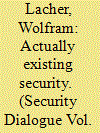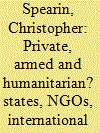|
|
|
Sort Order |
|
|
|
Items / Page
|
|
|
|
|
|
|
| Srl | Item |
| 1 |
ID:
083435


|
|
|
|
|
| Publication |
2008.
|
| Summary/Abstract |
The transformation of Saharan populations into an object of global security is analysed as a specific instance of security's expansion globally, as well as of its merger with development, understood as a side-effect of the former. It is shown that the search for threats in the Sahara, and the establishment of surveillance apparatuses, is a precondition for the detection and discursive production of these threats. Security, through its production of knowledge, manages to objectify what had hitherto constituted a borderland of knowledge and government. The securitization of the Sahara and its populations creates a field of intervention for diverse agents of security and development. However, it does so not as part of a coherent global regime of control, but on its own specific and random terms, within a political economy of danger that is the product of discursive and material struggles. The securitization of the Sahara, it is argued, should be seen as actually existing security - that is, a complex of security practices serving diverse interests, with contradictory and open-ended outcomes
|
|
|
|
|
|
|
|
|
|
|
|
|
|
|
|
| 2 |
ID:
083434


|
|
|
|
|
| Publication |
2008.
|
| Summary/Abstract |
The article contends that, in the light of contemporary challenges, states are not only changing the meaning of the word `humanitarian', but are also creating an expanding marketplace that includes international private security companies (PSCs) in the delivery of humanitarian assistance. Three types of factors - supply, demand, and ideational - have led to this development. On the supply side, state-demanded limitations on the private employment of violence and reduced commercial opportunities in Iraq have called for PSC diversification. On the demand side, states increasingly wish for non-state partners that are comfortable with their involvement in integrated solutions, something that PSCs, rather than nongovernmental organizations (NGOs), are more willing to embrace. On the ideational side, NGOs are concerned that humanitarian endeavour is losing its neutral and impartial status in order to facilitate counterinsurgency, `hearts and minds' activities. PSCs, in contrast, are content with the partial delivery of assistance and likely will continue to be so given, in large part, the experiences of their personnel.
|
|
|
|
|
|
|
|
|
|
|
|
|
|
|
|
| 3 |
ID:
083436


|
|
|
|
|
| Publication |
2008.
|
| Summary/Abstract |
key objection raised by terrorism scholars and policymakers against engaging in negotiations with terrorists is that it legitimizes terrorist groups, their goals and their means. Talking to them would serve only to incite more violence and weaken the fabric of democratic states, they argue. With the emergence of Al-Qaeda and its complex transnational structure, many have added another objection: Who does one talk to? Faced with such a multifaceted, horizontal organization, how does one engage? This article offers an alternative approach to the question of legitimacy and complexity in engaging with terrorism. Drawing from research in peace and conflict studies, it analyses how these two factors may in fact be conducive to a nonviolent resolution of conflicts involving terrorist violence. Using the conflicts in Northern Ireland and the southern Philippine region of Mindanao as illustrations, the article argues that the legitimation of `terrorist' groups through talks can be a means to transform a conflict away from violence, while complexity may in fact open up new possibilities for engagement. The article concludes by examining how the naming of a group as `terrorist' can and is often designed to forestall nonviolent responses to terrorism.
|
|
|
|
|
|
|
|
|
|
|
|
|
|
|
|
|
|
|
|
|